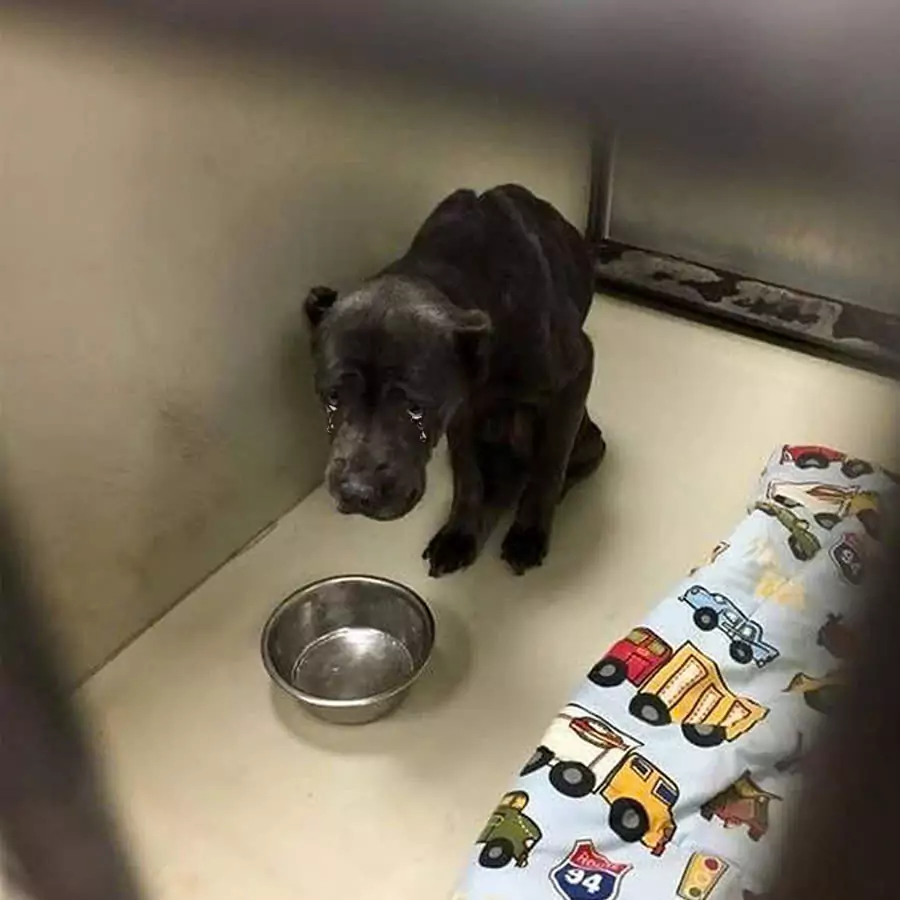At the USA 39 rescue station, among rows of kennels filled with barks and wagging tails, sat a quiet black dog named Blackbi. His fur was as dark as midnight, blending into the shadows of his small, cold enclosure. Unlike the other dogs, who barked excitedly at every visitor that passed by, Blackbi remained still, his deep brown eyes heavy with sadness.
Blackbi had been in the rescue station for months now. No one knew where he came from — he was found wandering alone, dirty and hungry, with no collar and no chip. He didn’t know how long he had been on the streets before a shelter worker found him curled up under an old bench. All Blackbi knew was that he was alone, and he had been alone for as long as he could remember.
Despite the shelter staff’s best efforts, Blackbi was always overlooked. People wanted puppies, or dogs with bright coats and lively personalities. But Blackbi wasn’t lively. He wasn’t the kind of dog that jumped at strangers, eager to please. He was tired — tired of waiting, tired of hoping.
Day after day, families came and went, adopting dogs left and right. Blackbi would sit quietly at the back of his kennel, watching each joyful reunion with a heavy heart. He had never known what it was like to be chosen, to belong to someone, to be loved.
“Eight billion people in the world,” Blackbi thought to himself one night, resting his head on his paws, “and not one of them loves me.”
He looked out through the bars of his kennel at the other dogs, some of them lucky enough to have found homes, others still waiting, tails wagging in hope. But Blackbi didn’t have the strength to wag his tail anymore. Hope had left him long ago, like everything else in his life.
—
Sometimes, when the shelter lights went off, Blackbi would imagine what it might be like to have a family. He’d dream of soft hands scratching behind his ears, a warm bed to sleep on, and someone whispering, *”Good boy, Blackbi,”* just before he drifted off to sleep. But every morning, the dream would fade, replaced by the cold concrete floor beneath him.
Blackbi often wondered if he was invisible. No one ever stopped to look at him for more than a second. He heard people say things like, “Oh, he’s too old,” or “He looks too serious.” Some would walk by and say, “Poor thing,” but none of them stayed long enough to see the gentle soul hidden behind his sad eyes.
And so, Blackbi stayed in the corner of his kennel, waiting for a miracle that never seemed to come. Each passing day chipped away at the little bit of hope he had left, until all he could do was lie there, lost in a world that didn’t seem to have a place for him.
—
One rainy afternoon, the shelter doors opened, and a young woman with kind eyes walked in. She wasn’t looking for a perfect dog — she was just looking for one who needed her. As she walked down the rows of kennels, her eyes landed on Blackbi, curled up quietly in the shadows.
Unlike the others, Blackbi didn’t jump up or bark. He only lifted his head slightly, his sad brown eyes meeting hers. There was no hope left in his gaze, only quiet acceptance — as if he had already made peace with being alone forever.
The woman crouched down in front of his kennel, her heart breaking at the sight of him. “Hey, buddy,” she whispered softly. “What’s your name?”
Blackbi stared at her, unsure if she was really speaking to him. No one ever spoke to him. After a long pause, the woman reached out a hand through the bars, not to pull him or drag him out — just to let him know she was there.
Blackbi hesitated, then slowly leaned forward, pressing his nose against her hand. It was the first gentle touch he had felt in what seemed like an eternity. And in that moment, something inside him stirred — a tiny flicker of warmth, like a spark trying to ignite in a long-dead fire.
The woman smiled, tears welling in her eyes. “You’re not invisible, Blackbi,” she whispered. “I see you.”
—
That day, Blackbi left the rescue station for the first time in months. He didn’t know what the future held, but as the woman led him out into the world, a small part of him dared to hope again.
Maybe, just maybe, he wouldn’t have to be alone anymore.
And in a world of 8 billion people, one person was enough to make all the difference.










